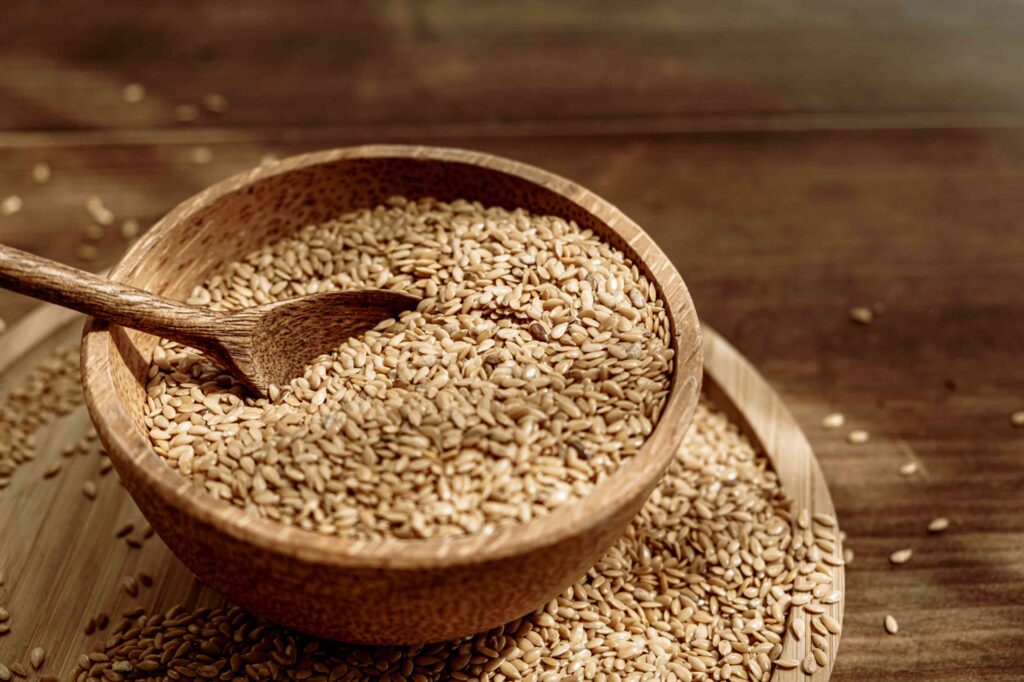:max_bytes(150000):strip_icc():format(jpeg)/Health-Stocksy_txpeabc5d17FE3400_Medium_3833539-b6a0f27a5043453eba5a442178303f45.jpg)
Flaxseeds are tiny, golden-brown seeds from the flax plant (Linum usitatissimum), a blue flowering annual herb. Flax is cultivated in over 50 countries, and Canada and India are among its most prominent producers.
Flaxseeds have many health benefits, such as protection against inflammation, diabetes, cancer, and cardiovascular diseases. They are rich in essential nutrients, including omega-3 fatty acids like alpha-linolenic acid (ALA), and they’re an excellent source of dietary fiber, protein, and antioxidants like lignans.
Adding ground flaxseeds to your oatmeal can be an excellent way to increase its nutritional value. Sprinkle 1–2 tablespoons on top of cooked oats and stir them in for a boost of antioxidants, omega-3 fatty acids, and fiber. You can also add flaxseeds to the oats while they cook or mix them in with other toppings, like honey, nuts, or fruits.
Flaxseeds blend effortlessly with oatmeal, improving its nutrient profile without altering its taste too much. They add a mild, nutty flavor and can subtly enhance cooked oats’ texture.
Adding ground flaxseeds to cold breakfast cereals is a simple and nutritious way to increase their nutritional value. Simply sprinkle 1-2 tablespoons of ground flaxseeds over your cereal of choice.
The seeds can add omega-3 fatty acids, fiber, and antioxidants, and their mild flavor pairs well with various whole-grain cereals. Ground flaxseeds mix quickly into cereal without altering the texture. Incorporating flaxseeds is a simple way to make morning meals a more nutrient-dense start to the day.
In addition to your usual smoothie ingredients like fruits, vegetables, and protein, add 1-2 tablespoons of ground flaxseeds to boost its health benefits.
Flaxseeds are rich in lignans, potent antioxidants with many health benefits. Research has shown that flaxseeds are the most concentrated source of lignans in food. Lignans have been linked to a reduced risk of certain cancers, cardiovascular disease, and diabetes.
Ground flaxseeds blend easily into smoothies without significantly affecting the texture. They can be a powerful addition to an already nutrient-dense beverage.
Ground flaxseeds can be easily incorporated into baked goods, adding essential nutrients and flavor. Flaxseeds work well in recipes for cookies, pancakes, muffins, bread, and more. Replace a small portion of the flour with 1-2 tablespoons of ground flaxseeds or add them directly to the batter. Some recipes may require trial and error to find the correct ratios.
Flaxseeds provide omega-3 fatty acids and fiber to support heart health and digestion. Flaxseeds can be a powerful addition to baked goods recipes, improving the nutritional quality without altering taste or texture.
Flaxseeds can also be added to everyday condiments like mayonnaise, mustard, and salad dressings. Stir 1–2 tablespoons of ground flaxseeds into store-bought or homemade condiments to boost their healthy fat, fiber, and antioxidant content.
Ground flaxseeds tend to blend seamlessly into sauces and dressings without significantly altering their flavor, making it a convenient way to improve the nutritional profile of common household condiments. Consider adding flaxseed to vinaigrettes, guacamole, or chickpea hummus.
Flaxseeds are a common egg substitute, especially in vegan or allergy-friendly recipes. Flaxseeds can work as an egg replacer in recipes like muffins, pancakes, and cookies.
To replace one egg, mix 1 tablespoon of ground flaxseed with approximately 3 tablespoons of water. Allow the mixture to sit for 5-10 minutes or until it forms a gel-like consistency. The flax egg works by binding ingredients together, similar to regular eggs.
In addition to their binding properties, flaxseeds provide essential nutrients to standard recipes. Using ground flaxseeds as an egg substitute can be an excellent way to add health benefits to vegan or vegetarian dishes.
Flaxseeds can also enhance savory dishes with their subtle flavor and nutritional benefits. Ground flaxseeds can be sprinkled over salads, added to grain bowls, or mixed into soups and stews.
They blend smoothly into marinades, sauces, and dressings, offering a mild, nutty flavor without significantly altering the dish. Flaxseeds can also be mixed into burgers, hash, and meatballs as a binding agent.
Yogurt parfaits are a nutrient-dense breakfast or snack option; adding flaxseeds can increase their nutritional value even further. Sprinkle 1-2 tablespoons of ground flaxseeds on top of the yogurt and add layers of other ingredients, such as fruits, granola, and nuts.
Flaxseeds provide omega-3 fatty acids to support heart health, fiber to enhance digestion, and antioxidants to combat harmful free radicals. The added fiber also helps promote satiety, making yogurt parfaits a more satisfying meal or snack.
Ground flaxseeds blend easily into yogurt without significantly altering the flavor, texture, or bacteria content, making them an easy way to improve the health benefits of your parfait snack.
Flaxseeds are consumed in three major forms: whole flaxseed, ground flaxseed, and flaxseed oil. Whole and ground flaxseeds are the most popular.
Whole flaxseeds are rich in fiber, healthy fats, and lignans, but their hard outer shell can make it challenging to digest and absorb their nutrients effectively. Grinding the seeds breaks the seed coat barrier, making them easier to digest. This breakdown also makes flaxseed more sensitive to oxidation or spoiling.
Whole flaxseeds should be stored in an airtight container at room temperature to preserve their health-promoting properties. Most whole flaxseeds can stay fresh in these settings for 4-20 months. Use a coffee grinder or blender to grind whole flaxseeds. Ground flaxseeds should be used shortly after grinding and stored for only a short period.
Ground flaxseeds can be added to smoothies, oatmeal, and baked goods, while whole flaxseeds can be used as toppings for recipes that require more digestion time.
Flaxseed Oil
The oil extracted from flaxseeds is the most concentrated source of alpha-linolenic acid, but it lacks the fiber and lignans found in whole flaxseeds, meaning flaxseed oil is less nutritionally complete. It’s also more sensitive to oxidation, giving it a very short shelf-life. Flaxseed oil should be stored in a glass container in the refrigerator to maximize its freshness.
Flaxseed oil can be used in baked foods like muffins and bagels. Many experts still recommend using ground flaxseeds, which offer comparable ALA content and longer shelf life.
To grind flaxseeds at home, you’ll need a coffee grinder, food processor, or blender. Measure your desired amount of flaxseeds and add them to the grinder or blender. Most small devices can easily grind 1-2 tablespoons at a time.
Pulse the flaxseeds in your blender until they’ve reached a fine, powder-like texture. Grind the flaxseeds immediately before use to preserve their freshness and prevent oxidation. If you end up with extra, you can store the ground flaxseeds in an airtight container in the refrigerator or freezer.
Flaxseeds are a nutrient-dense superfood, but their health benefits won’t outlive their shelf lives. The average shelf-life varies, and the best storage techniques differ among flaxseed varieties:
- Whole flaxseeds: Whole flaxseeds have the most extended shelf-life of all the flaxseed varieties. To maximize their freshness for up to 20 months, store whole flaxseeds in an airtight container in a cool, dark place.
- Ground flaxseeds: Grinding flaxseeds break down their hard outer shell, increasing their risk of oxidation. To maximize their freshness, store them in the refrigerator or freezer in an airtight container for up to approximately three months.
- Flaxseed oil: The oil extracted from flaxseeds is highly susceptible to spoiling. Store flaxseed oil in a glass container in a dark, cool place for up to six months to prevent oxidation.
Flaxseeds have seen a lot of hype in the wellness space recently, and rightfully so. Research has shown that including flaxseeds in a well-balanced diet offers many potential health benefits.
Flaxseeds are rich in omega-3 fatty acids, fiber, and antioxidants. Research has linked regular flaxseed consumption with improvements in cardiovascular health, blood sugar control, and inflammation.
There are several ways to incorporate flaxseeds into your daily diet. You can add them to smoothies, baked goods, hot and cold breakfast cereals, and more.













